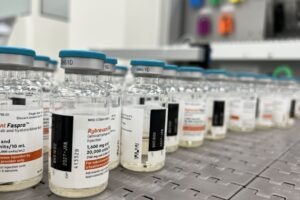Personalis has partnered with Duke University and Olink Proteomics for a research collaboration to study the impacts of immunotherapy on advanced gastroesophageal cancer.

Image: The partnership will particularly focus on identifying composite biomarkers. Credit: Chokniti Khongchum from Pixabay.
Subscribe to our email newsletter
The partnership will particularly focus on identifying composite biomarkers, which integrate several biological entities into a single readout.
This identification will help guide therapeutic decision making.
Gastroesophageal cancer is the fourth most common cancer across the world.
Almost 50% of patients develop unresectable or metastatic disease right at the time of diagnosis.
Currently, chemotherapy is the standard of care for patients with this kind of advanced disease. However, its effectiveness many times gets reduced as several patients develop therapeutic resistance.
Once the therapeutic resistance develops, the median overall survival for patients drops to less than nine months.
Personalis stated that fortunately, pembrolizumab, an immunotherapeutic targeting PDL1/PD1, has secured approval from the US FDA for use in patients with chemorefractory gastroesophageal cancer.
Due to the effectiveness of this biologic, there is significant interest in applying it as a first-line, standard of care treatment for patients who have moved to advanced disease.
The aim of the collaborative study is to characterise important tumour and immunological responses to pembrolizumab and ‘shine light’ the potential mechanisms that lead to either sensitivity or resistance to immunotherapeutics in gastroesophageal cancer.
The team by detailing how tumours respond to treatment at the transcriptomic, genomic, and proteomic levels, it intends to understand biomarkers that may aid physicians predict tumour responses to pembrolizumab and accordingly make adjustments to the treatment strategies.
Personalis chief medical officer and senior vice president of R&D Dr. Richard Chen said: “We believe the clinical management of cancer can substantially improve with early determination of patient response and by accurately informing changes to treatment regimens. Such determinations offer the potential to avoid unnecessary toxicities and increase survival.
“By collaborating with researchers at Duke and Olink, we hope to accelerate advances in oncology practice via ultra-sensitive MRD detection.”
Personalis’ ImmunoID NeXT Platform will be leveraged for characterisation of tumour genomic and transcriptomic alterations, in addition to differences between responders and non-responders.
Furthermore, the company’s NeXT PersonalTM assay will be leveraged to examine circulating tumour DNA (ctDNA) collected from patients to profile and precisely track molecular residual disease (MRD) during the course of therapy.
Olink Explore panels will be deployed to examine plasma samples and tumour tissues from metastatic gastroesophageal cancer patients who are being treated with anti-PD1 and anti-PD1/chemotherapy.
 Advertise With UsAdvertise on our extensive network of industry websites and newsletters.
Advertise With UsAdvertise on our extensive network of industry websites and newsletters.
 Get the PBR newsletterSign up to our free email to get all the latest PBR
news.
Get the PBR newsletterSign up to our free email to get all the latest PBR
news.

